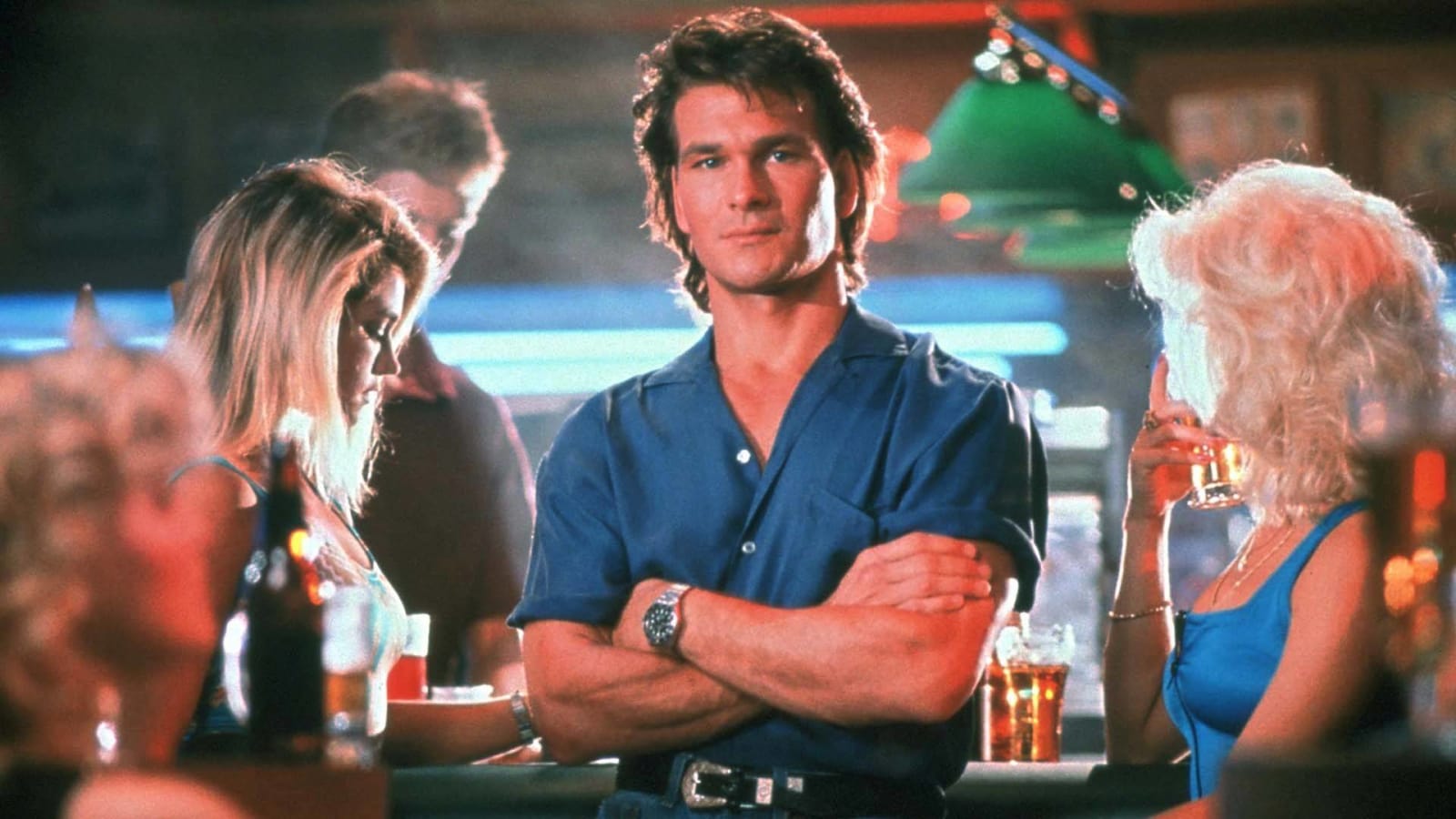
"Road House" 30 years later: Zen and the art of bouncing
“Be nice. Until it’s time to not be nice.” – Ancient bouncer proverb
When Rowdy Herrington’s “Road House” kicked its way into U.S. movie theaters on May 19, 1989, the vast majority of American moviegoers avoided it like the local dive bar notorious for stabbings and spent shell casings in the parking lot. Had “Road House” been a traditional, period Western with non-stop saloon brawls and assorted lawlessness into which rode an inexplicably new-age bouncer…well, it probably would’ve flopped, too, because no one was going to see Westerns in the late 1980s.
The critics did their naysaying part. Caryn James of The New York Times, for instance, quipped that Patrick Swayze’s post-“Dirty Dancing” star turn as the philosophical "cooler," Dalton, "makes his career look like a bad joke." Amid the cacophony of pans, only Chicago critics Dave Kehr and Roger Ebert dared to suggest the film might potentially be in on its own sleazy/silly joke. But even Ebert, a champion of low entertainment from time to time (and a noted writer of one), heavily qualified his two-and-a-half-star review, observing that, "'Road House' exists right on the edge between the 'good-bad movie' and the merely bad."
I would never accuse Ebert of being less than completely forthright in a review, but could it be that the man who once typed out the phrase "You will drink the black sperm of my vengeance" felt, 20 years on, just a tad queasy about turning his thumb all the way up on a film featuring bon mots like, “I used to f*** guys like you in prison?”
Mightn’t have Kehr fully embraced the Schlitz-soaked camp of Herrington’s film had he viewed Ben Gazarra’s small-town despot Brad Wesley as, theoretically, the sadistically conservative little brother of Mercedes McCambridge’s Emma Small in “Johnny Guitar”? Sure, Wesley’s ticked off about not getting a taste of the profits from the newly revitalized Double Deuce nightclub, but his ire is particularly heightened by the presence of the tai-chi-practicing, situationally pacifist Dalton, who’s carrying on a ready-for-Skinemax affair with the beautiful Doc (Kelly Lynch) in a refurbished barn just across the river from (i.e. well within eyesight of) Wesley’s sprawling estate. He wants this intellectually enlightened, peace-and-love s*** out of the town he largely owns.
Working from a screenplay credited to R. Lance Hill and Hilary Henkin, it’s possible Herrington, a pretty good writer himself (check out his debut feature, “Jack’s Back), was subverting hoary old Western tropes via this R-rated action extravaganza produced by mayhem maestro Joel Silver (“Lethal Weapon” and “Die Hard”).
"Road House" is certainly every bit as perverse as "Johnny Guitar," but its camp machismo is of the beer commercial variety that appeals to meatheads who view alcohol as a sexual pump-primer. And while those types of dirtbags certainly get their skulls cracked and limbs napped throughout the movie, the film is still partially calibrated for their enjoyment too (whereas those prone to consuming a case of Natural Light while sitting on it 'til there’s nothin' to sit on no more would likely tap out less than 15 minutes into “Johnny Guitar”).
The scene where Julie Michaels’ Denise is forced by Wesley to perform a liquor-code-violating strip tease in front of Dalton and his cooler crew is meant to be humiliating, but she looks sensational doing it. Alas, that’s quintessential B-movie filmmaking: You can revel in and be repelled by the sleaze; you're just worried about the segment of the audience that’s pissed when Dalton cuts her coerced routine short.
The buzzed, grizzled, bathed-in-motor-oil heart of "Road House" is undeniably Sam Elliott, who plays Dalton’s Obi-one-too-many mentor, Wade Garrett. From the minute he regards his new dive of employment as "the Double Douche," you know this man booze-sweats wisdom. Spiritually, Wade feels like Elliott’s character from "Mask," and it’s oddly touching to speculate that when things didn’t work out with Cher, he hopped on his chopper and made an itinerant living as the most sought-after bouncer in America.
Given Herrington’s rigid adherence to formula, you know Garrett’s murder at the hands of Wesley’s thugs is going to incite Dalton’s late-second-act, really-not-nice rampage. And you can also surmise the dispatching of said thugs won't be pretty — especially since the writers have none-too-subtly foreshadowed Dalton’s penchant for ripping out the throats of folks who really steam his clams. So while you wish Dalton would maybe cool it on the trachea-tearing, if someone murdered your best friend and that best friend was Elliott, you might snatch yourself a windpipe too.
Herrington helpfully shot all of "Road House" like a comic book (if not a Ralph Bakshi cartoon), which takes the edge off. In terms of over-the-top '80s actioners, it’s far more friendly and moralistic than, say, "To Live and Die in L.A." or "Beverly Hills Cop II." It’s a neon Western. The good guys triumph, the bad guy is righteously shot to death by the town elders, and our two remarkably photogenic leads have photogenic sex in a swimming hole over the end credits.
"Road House" has it all. And perhaps you could have it all too, if you’d just…be nice.
More must-reads:
Trending in Entertainment
Customize Your Newsletter
 +
+
Get the latest news and rumors, customized to your favorite sports and teams. Emailed daily. Always free!

